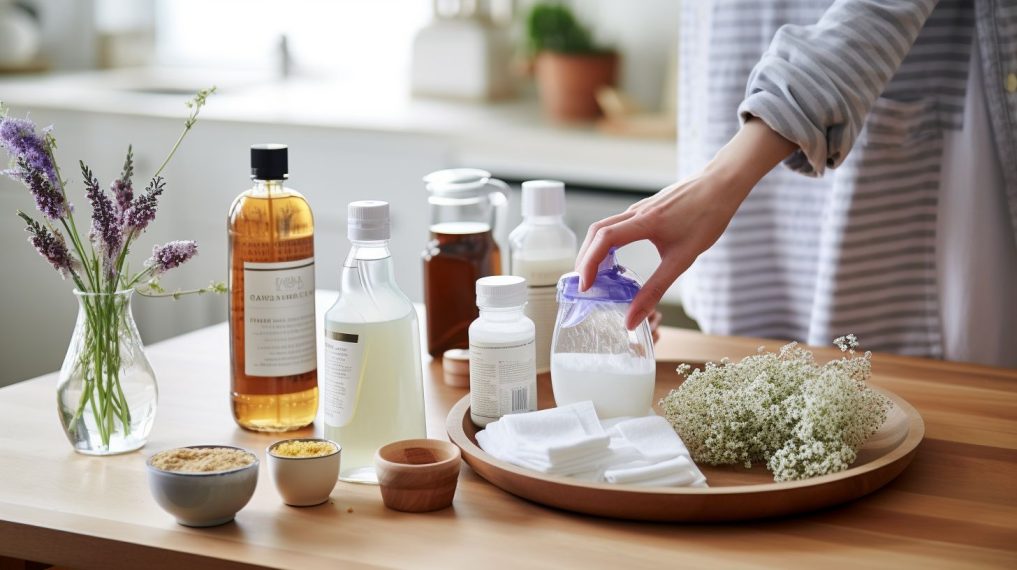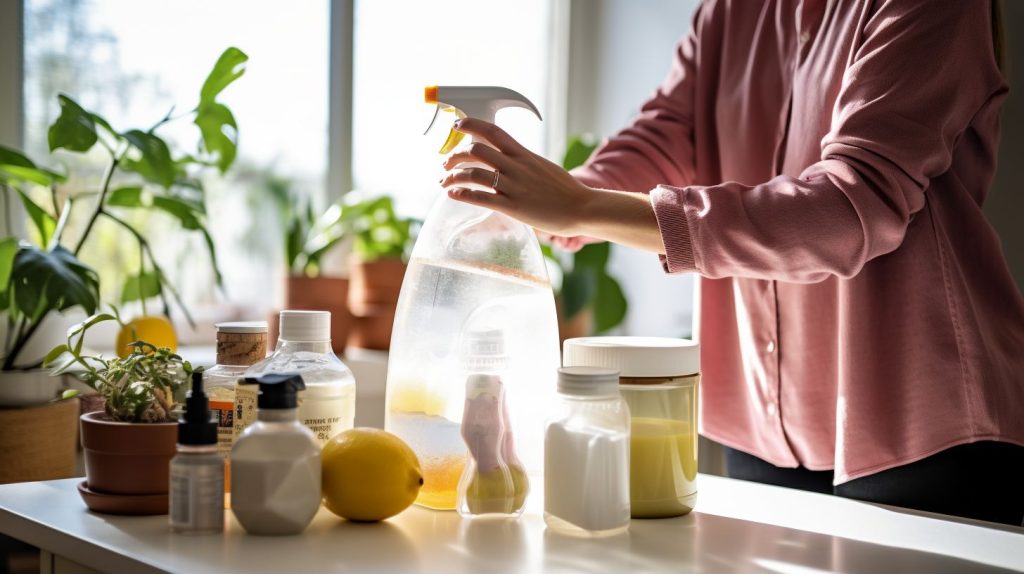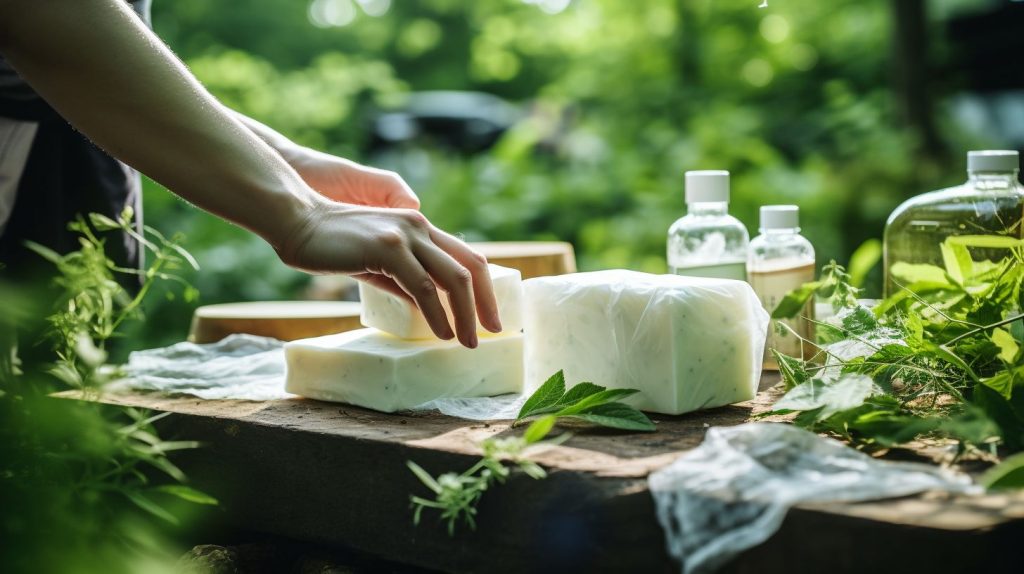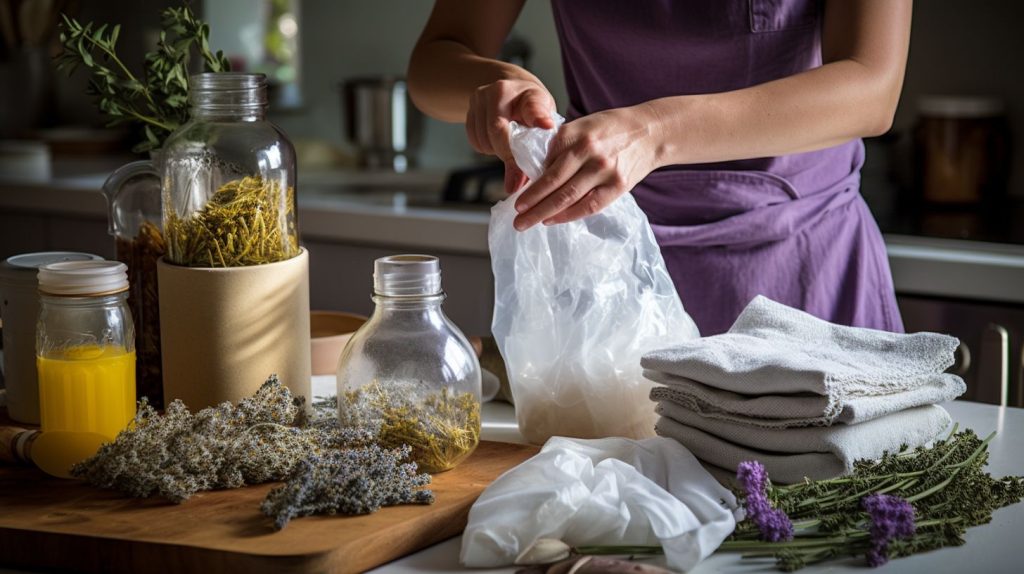
Are you tired of harsh chemicals and expensive prices on laundry detergents? Homemade laundry soap is easy to make and uses simple, safe ingredients. This guide will show you the steps to create your own effective detergent that’s kind to both your wallet and clothes.
Let’s get started!
Key Takeaways
- Homemade laundry detergent saves money and reduces exposure to harsh chemicals found in commercial brands.
- You can customize your own soap with natural ingredients like borax, washing soda, and essential oils for personalized scent preferences.
- To prevent homemade laundry soap from becoming chunky, ensure all ingredients are completely dissolved and store the detergent in a properly sealed container.
- Making your own laundry soap is eco – friendly; it minimizes harmful chemicals released into the environment.
- Homemade laundry detergents can be used effectively in both standard and high-efficiency washing machines if created with low-sudsing formulas.
Benefits of Making Your Own Laundry Soap
Making your own laundry soap has several benefits. It’s cost-effective, safer for your family, and allows you to customize the ingredients to suit your needs.
Lower Cost
Making your own laundry soap doesn’t just cut down on chemicals, it also keeps your wallet happy. The ingredients for DIY laundry detergent usually come in larger quantities and cost less than buying commercial brands over time.
You’ll find that with each batch of homemade laundry soap, the price per load plummets, leading to significant overall savings.
Switching to homemade laundry soap is a budget-friendly choice that adds up month after month. Instead of spending dollars on store-bought options, you mix natural ingredients by yourself for only pennies per load.
This economical approach not only benefits your household budget but also offers a cost-effective way to handle everyday chores without breaking the bank.
Safer for Your Family
Homemade laundry soap provides a chemical-free alternative to traditional detergents. By making your own, you eliminate the potential risks associated with exposing your family to harsh chemicals.
These store-bought products often contain ingredients that can cause skin irritation or allergic reactions in sensitive individuals. With DIY laundry soap, you decide what goes into the mix, creating a nontoxic laundry detergent that’s gentle on everyone’s skin.
Protecting your loved ones becomes simpler with natural cleaning products. Not only do they keep harmful substances out of your home, but they also contribute to an environmentally friendly lifestyle.
Embrace the peace of mind that comes from knowing exactly what is cleansing your family’s clothes—pure, safe ingredients mixed by you for ultimate protection and health benefits.
Customizable Ingredients
Making your laundry soap doesn’t just mean it’s safer for your family; it also puts you in control of what goes into each batch. You can tailor the scent, strength, and eco-friendliness to suit your personal needs.
Choose from a variety of natural scents like lavender or lemon by adding essential oils, or leave it unscented for a fragrance-free clean.
Adjustable ingredients are ideal for those with sensitive skin or allergies. By selecting specific components, you create an individualized laundry solution that minimizes risks of irritation.
Experiment with different amounts of borax, washing soda, and bar soaps such as Fels Naptha until you find the perfect mix for your household’s laundry needs.
Ingredients to Use in Homemade Laundry Soap
When making your own laundry soap, it’s important to use safe and natural ingredients that are effective at cleaning clothes. From essential oils for fragrance to washing soda for stain-fighting power, there are plenty of options to choose from when customizing your homemade detergent.
List of Safe Ingredients
When making homemade laundry soap, it is important to use safe and gentle ingredients that are effective in cleaning clothes. Here are the recommended safe ingredients for creating your own eco-friendly and non-toxic laundry soap:
- Borax: A natural mineral compound that boosts the cleaning power of soap and helps remove stains and odors from clothes.
- Washing soda: Also known as soda ash or sodium carbonate, it is a key ingredient for removing tough stains and boosting the effectiveness of laundry soap.
- Soap flakes: These natural, biodegradable flakes can be made from pure vegetable oil or plant-based ingredients and serve as a gentle cleansing agent for clothes.
- Liquid Castile soap: A versatile, all-natural soap made from plant oils like olive oil, it’s environmentally friendly and suitable for sensitive skin.
- Laundry bar soap (e.g., Zote, Fels Naptha): Traditional bar soaps specifically designed for efficient stain removal and fabric care in homemade laundry detergent recipes.
- Dawn dish soap: Often used in small amounts for its powerful grease-cutting abilities in DIY laundry soaps.
Ingredients to Avoid in Store-Bought Detergents
Harmful chemicals found in store-bought detergents can have a negative impact on both your health and the environment. Choosing to make your own laundry soap allows you to avoid these harmful ingredients and create a safer, more eco-friendly alternative.
Harmful Chemicals
Many store-bought laundry detergents contain harmful chemicals like diethanolamine, sodium lauryl sulfate (SLS), sodium laureth sulfate (SLES), phosphates, and formaldehyde. These toxic substances have been linked to liver, kidney, and reproductive issues in animal studies.
Moreover, these hazardous ingredients pose environmental risks and can be harmful to human health over time due to their toxicological effects. It’s important to be aware of these unsafe additives and opt for safer homemade laundry soap options with natural ingredients.
The inclusion of diethanolamine and SLS/SLES in commercial detergents warrants caution as they are proven toxicants according to toxicological studies. Additionally, the presence of phosphates contributes to water pollution while formaldehyde is a known carcinogen.
Negative Impact on the Environment
Switching from store-bought detergents to homemade laundry soap can reduce the negative impact of harmful chemicals on the environment. Common laundry detergents contain volatile organic compounds (VOCs) that contribute to air and water pollution, harming ecosystems and human health.
By opting for Earth-friendly alternatives, you can help minimize the release of these hazardous substances into the environment while still achieving clean and fresh-smelling clothes.
Making this small change can lead to a positive environmental impact by reducing the amount of toxic chemicals being released into our surroundings.
How to Make Homemade Laundry Soap
Gathering equipment and ingredients is the first step in making homemade laundry soap. Followed by step-by-step instructions and tips for success to ensure a successful batch of DIY detergent.
Gathering Equipment and Ingredients
To make homemade laundry soap, gather the necessary ingredients and equipment. You will need Fels Napthia, washing soda, borax, and pure bar soap or castile soap for the detergent.
Additionally, have a 5-gallon bucket and hot tap water ready. You’ll also need a grater or shredder to prepare the soap. A one-gallon jug and a pot are recommended for dissolving the grated soap.
These items are essential for creating your own effective and economical laundry detergent.
Step-by-Step Instructions
After gathering the necessary equipment and ingredients, follow these step-by-step instructions to make your own homemade laundry soap:
- Grate or chop the soap bar until finely ground using a food processor.
- Boil 8 cups of water in a large pot.
- Add the grated soap to the boiling water and stir until dissolved.
- In a separate bowl, mix 2 cups of borax and 2 cups of washing soda.
- Once the soap is dissolved in the water, pour in the borax and washing soda mixture, stirring well.
- Let the mixture sit overnight to thicken.
- Use about 1 cup per load when adding your homemade laundry soap liquid to your washer.
Tips for Success
For successful homemade laundry soap, store it in an airtight container to prevent clumping and preserve its effectiveness. Carefully measure the ingredients to maintain the right balance and avoid chunkiness in your detergent.
If using a high-efficiency washer, ensure that your DIY laundry soap is compatible with such machines for optimal cleaning results. Proper storage, precise measuring, and appliance compatibility are essential factors for successfully making and using homemade laundry detergent.
To keep your natural laundry soap effective, understand its shelf life; typically around six months to one year if stored properly. Also, consider experimenting with different bar soaps or adding essential oils for customization while keeping in mind potential allergies or sensitivities.
Tips for Making and Using Homemade Laundry Detergent
Proper storage is key to maintaining the effectiveness of your homemade laundry detergent. Measuring carefully, avoiding chunkiness, using it in HE washers, and understanding its shelf life are also important tips for success.
Proper Storage
Store homemade laundry detergent in an airtight container, whether it’s glass or plastic. Ensure the container has a tightly fitting lid to maintain the detergent’s effectiveness. For liquid detergent, use a 2-liter capacity container and add 6 cups of room temperature water and 1 cup of washing soda for proper storage.
Maintain the quality and shelf life of your DIY laundry soap by storing it in an airtight container with a secure lid. Whether you choose glass or plastic, make sure the vessel is capable of sealing tightly to preserve your homemade cleaning solution effectively.
Measuring Carefully
Grate the bar soap with caution, ensuring precise measurements for your homemade laundry detergent. Accurate amounts of Borax and washing soda are crucial to the effectiveness of your DIY laundry soap.
Avoiding Chunkiness
To prevent chunkiness in homemade laundry detergent, it is crucial to ensure that the ingredients are fully dissolved. This can be achieved by using hot water and thoroughly stirring the mixture until all components are completely integrated.
By following specific steps in recipes and allowing for proper dilution of ingredients, chunkiness can be minimized or eliminated altogether. It’s essential to pay attention to guidance provided in different homemade laundry detergent recipes, as some may offer troubleshooting advice specifically aimed at addressing concerns related to chunkiness.
Additionally, ensuring that grated Fels-Naptha soap is fully dissolved before adding it to the rest of the ingredients can help prevent chunkiness from occurring during the detergent-making process.
Using in HE Washers
Homemade laundry detergent can be used in high-efficiency (HE) washers, as long as it is a low-sudsing formula. It’s important to follow the recommended usage amount to prevent oversuding and ensure effective cleaning.
Whether in liquid or powder form, homemade laundry soap can be a great eco-friendly alternative for HE washer users.
When using homemade detergent in an HE washer, measure carefully and avoid overpouring. This will help maintain the effectiveness of the detergent while preventing excess suds that could potentially cause issues with your machine.
Shelf Life and Effectiveness
Homemade laundry detergent can maintain its effectiveness for up to six months when stored properly. It is important to keep it in a dry and cool place, away from direct sunlight and moisture, to prevent clumping and ensure its longevity.
When using homemade soap for laundry, be sure to measure the amount carefully as excess soap can lead to residue build-up on clothes. Additionally, thoroughly rinsing the laundry after washing helps remove any lingering soap particles that may cause irritation or reduce fabric softness.
To maximize the shelf life and effectiveness of your natural laundry detergent, consider making smaller batches more frequently rather than large quantities that may not be used within the recommended timeframe.
Conclusion
In conclusion, making your own laundry soap offers numerous benefits such as cost savings and the ability to tailor ingredients to suit your family’s needs. By using safe and natural ingredients, you can create a detergent that is gentle on clothes and the environment.
With simple steps and basic equipment, anyone can craft their homemade laundry soap, ensuring effective cleaning without harmful chemicals or additives. Try out different recipes to find the one that works best for you, whether it’s in liquid or powder form, providing a sustainable and eco-friendly option for your household cleaning needs.
FAQs
1. What ingredients do I need to make homemade laundry soap?
To make homemade laundry soap, you will need ingredients such as washing soda, borax, and a bar of soap.
2. Can I use homemade laundry soap for all types of washing machines?
Yes, homemade laundry soap can be used in both top-loading and front-loading washing machines.
3. How much homemade laundry soap should I use per load of laundry?
For a standard load of laundry, 2-4 tablespoons of homemade laundry soap is typically sufficient.
4. Is it cost-effective to make homemade laundry soap compared to buying commercial detergent?
Making your own laundry soap can be more cost-effective over time, especially if you regularly do large amounts of laundry.
5. Are there any special storage considerations for homemade laundry soap?
Homemade laundry soap should be stored in an airtight container away from moisture and direct sunlight to maintain its effectiveness.


